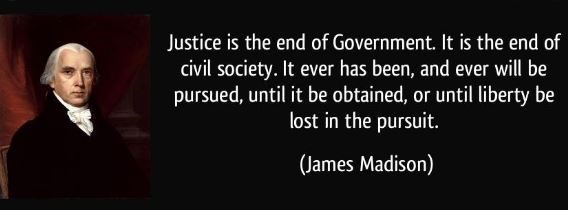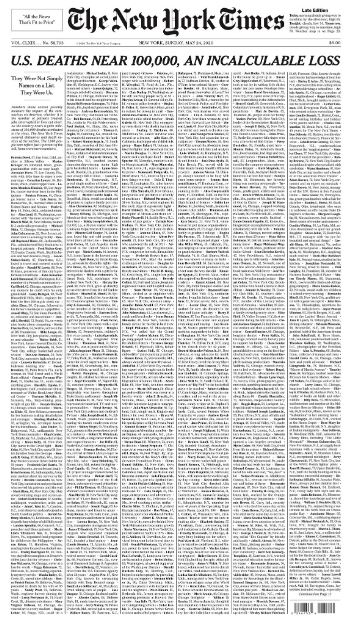
Amidst heated protests or even just a meltdown from a child with an adult custodian, we often hear this poking question: Where is justice?
Where is justice when tens of thousands of African and Hispanic minorities took to the streets across major American cities, mourning the death of an unarmed black man named George Floyd from Minneapolis? He died from a chokehold on his neck by a white police officer. This is an unfortunate and recurring American tragedy.
Where is justice when judiciary appointments to federal courts are on the smooth track toward conservative leanings, and the incumbent administration is rolling back in silence pivotal environmental legislation? Not only contemporary Americans during a span of one generation but also the minors and the unborn will have to live in a society with environmentally health risks and huge contention. The intra-and-intergenerational equity is going farther away from the underprivileged.
Where is justice when one can manipulate power to cover his misconducts and gets away with murder? Autocrats can do even further to glorify their sins because they can mute the public opinions, fire the watchdogs and rewrite laws to their advantage. Under the hit of the COVID-19 pandemic, while the public are confined in their homes and shelters for the public safety, the rulers use the pandemic to expedite their agendas of absolute power.
Brazil government’s environmental deregulation is yielding results. Mining and farming communities in the Amazon are expanding their land use on the already vulnerable “lungs of the planet.” According to Mapbiomas Brasil, a multi-institutional initiative, 99% of all deforestation in Brazil in 2019 was illegal—a total of 4,705 square miles, nearly the size of Connecticut, of native vegetation lost.
As the world is still battling the pandemic, China approves the Security Law to tighten control of Hong Kong. There was neither consultation nor due process. The top-down decision from Beijing caught the SAR administration as well as the local judiciary organs off guard.
National security is always how the ruling power sees it. Lifting the Security Law is justice to some but not to the opponents. Liu Xiaobo, the late Nobel Peace Prize laureate, wanted China to become democratic but his advocacy endangered national security in the eyes of the ruling power. Joshua Wong wants Hong Kong to have self determination and universal suffrage but the ruling power sees his advocacy the action of a traitor.
Adopting the same relativity lens to see the US legislation on national security, I don’t think Edward Snowden will be given a fair trial in the US because Snowden is a traitor in the eyes of the ruling power. Edward Snowden may be a hero to many global citizens but not to the US federal government. Likewise with Joshua Wong from Hong Kong to the Chinese authorities.
And the counter-espionage law is like lips and teeth to national security. Such law serves, as always, only the lawmakers who are loyal to their motherland in a democratic state, or are loyal to the ruler and his one-party regime in an authoritarian state.
To the pro-Beijing Hong Kong politicians, the Security Law is a defacto counter-espionage legislation aiming at anti-China intelligent activities in Hong Kong. Two former SAR Chief Executives—Tung Chee-hwa and Leung Chun-ying—have validated this point. Regardless of their lack of popularity, they have mentioned a piece of lesser-known history. Slamming on Beijing’s espionage network in Hong Kong, young Hong Kongers and the pro-Hong Kong advocates in the West may not bother to question the justice of the intelligent activities of the democratic states. Like diplomacy, it takes two to tango for intelligence work. That’s what makes crime mystery novels an all-time favorite to global readers.
Hong Kong is a safe haven not only for criminals but for spies. “The Pearl of the East” as Hong Kong is dubbed by the Chinese was once seen as a Casablanca of the East in terms of espionage due to its free-wheeling entrepot status under British rule. If you like James Bond movies, you may see that Hong Kong is a frequented rendezvous of Bond’s noteworthy missions.
Under British rule, there was the colonial-era Special Branch in Hong Kong. This agency was equivalent to a domestic intelligence agency like the CIA and FBI in the US, or Britain’s MI5 and MI6. After the Hong Kong Handover to mainland China in 1997, the British defacto intelligence agency in Hong Kong was also disbanded.
Six years later in 2003, on the heels of SARS—the viral cousin of the coronavirus, Hong Kong government proposed the Article 23 National Security Bill. The proposed bill caused an public outcry and a massive demonstration on July 1 to mark the sixth anniversary of Hong Kong’s Handover to China. The bill was shelved.
Without such legislation, Hong Kong government could only expel suspected spies without charges—presumably the foreign nationals will be banned from entry of Hong Kong while the Chinese nationals will defect for elsewhere after their spy cover are exposed. The most recent household names are William Wang (Wang Liqiang) who was an alleged Chinese spy fleeing mainland via Hong Kong for Australia; Simon Cheng who allegedly was tortured in mainland China for working for UK consulate in Hong Kong. The world renowned Edward Snowden also picked Hong Kong as his hideout locale. As Snowden recounted, hiding in a marginalized community in one of the poorest areas in Hong Kong was “genius.” He said, “[Hong Kong was] definitely the one place that no one was going to look for me.”
Giving such a free jail card to the party’s enemy definitely did not please Beijing. And fast track to 2020, on the heels of COVID-19 whose impact is no longer regional but global, Beijing this time finally voiced its pent-up anger and plugged the loopholes of a city without a so-called counter-espionage law.
Where is justice? I dare to ask further. What is justice?
Justice is the end of Government. It is the end of civil society. It ever has been, and ever will be pursued, until it be obtained, or until liberty be lost in the pursuit.
—James Madison
When I looked at the full front page of names in the New York Times on May 23, 2020, and clicked on the website with a visual interaction with the 100,000 lives lost in the pandemic in America, I was in tears and thought of the 70,000 plus I mourned only four weeks before. The death toll of 100,000 has exceeded the number of Americans who died in the Korean War, Vietnam War, Afghanistan War and Iraq War combined.
And yet, the country is reopening to business as usual without adequate test kits and medical aids. The ruler of the United States was seen playing golf at his Virginia course.
Where is justice?

